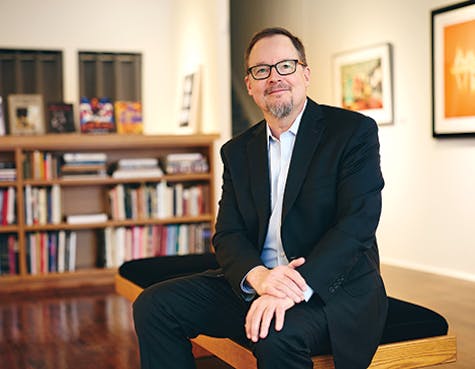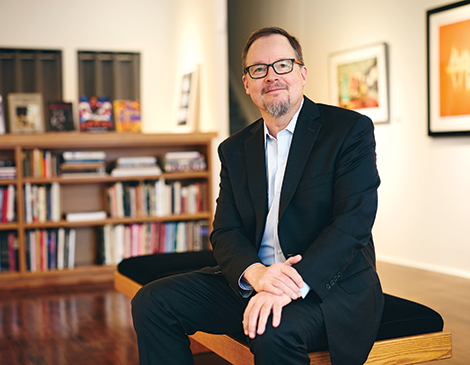
David Lusenhop’s gallery shows some of the preeminent African American artists of our time. By Afi Scruggs
Art dealer and gallery owner David Lusenhop started his interview by answering a question he’s used to being asked: Why does he, a white art collector, specialize in art by African American artists?
“White people tend to ask me, ‘Why are you interested’ as if they’re asking ‘Why should you be interested?’” says Lusenhop, standing behind a custom oak bookcase in his gallery on Lee Road in Cleveland Heights.
“African Americans often ask me why I’m interested,” he says. “And what they’re really saying is, ‘What are you doing with our art?’”
Lusenhop’s “Why?” is simple. “I’m very interested in the history of American art. And you can’t tell that story without the history of African American artists. You simply can’t tell it.”
For more than 30 years, Lusenhop has sold work by noted artists like Dawoud Bey, Kerry James Marshall, and Barbara Jones-Hogu. Last September, he opened his most recent gallery at 2248 Lee Road. Although he has private clients, he specializes in selling to public institutions. He has sold an entire collection to the Brooklyn Museum and sold and donated works to the Cleveland Museum of Art. He estimates he’s sold 50 works by African American artists to museums all over the country in the past two years.
“My belief is that by getting the work into public institutions, it can be studied. It can be seen. It can be preserved for all time,” he says.
Lusenhop’s introduction to African American art came at Walnut Hills High School, Cincinnati’s academically selective public high school. He’d been interested in art since childhood, but his African American studio art teachers taught artists and movements that standards texts like Janson’s History of Western Art ignored. Lusenhop, a self-described “library nerd,” searched for writings from African American scholars, but they were hard to find.
“There weren’t a lot of them in the ‘70s,” he says.
After a stint at Miami University, Lusenhop ended up in Chicago. He grew to know more about the African American artistic community, especially at the South Side Community Art Center, an incubator for African American artists since its founding more than 80 years ago. Lusenhop noticed few dealers were courting the substantial middle-
class community of African Americans on Chicago’s South Side.
“The South Side has a lot of deep pockets of old African American money,” he says, “and those were the caretakers of a lot of the visual culture.”
Lusenhop started out selling work by “historical masters” Charles White, a painter and muralist; Eldzier Cortor, painter and printmaker; and sculptor Elizabeth Catlett. He also began representing members of AfriCOBRA, the African Commune of Bad Relevant Artists. Founded in 1968, the collective’s members, including Cleveland painter Wadsworth Jarrell and artist Jae Jarrell, were dedicated to creating work grounded in a “Black aesthetic.” He opened a gallery in 2007, just a year before the Great Recession, which eventually shut him down. In the meantime, he married and eventually moved to Cleveland with his spouse.
At the space on Lee Road, Lusenhop continues the work he’s done since getting his first job in 1985: presenting the masters of African American art.
“I’m trying to show artists that were devoted to personal expression, cultural history and the craft of art making,” he says. “I’m selling the people that are best at their particular medium.”

